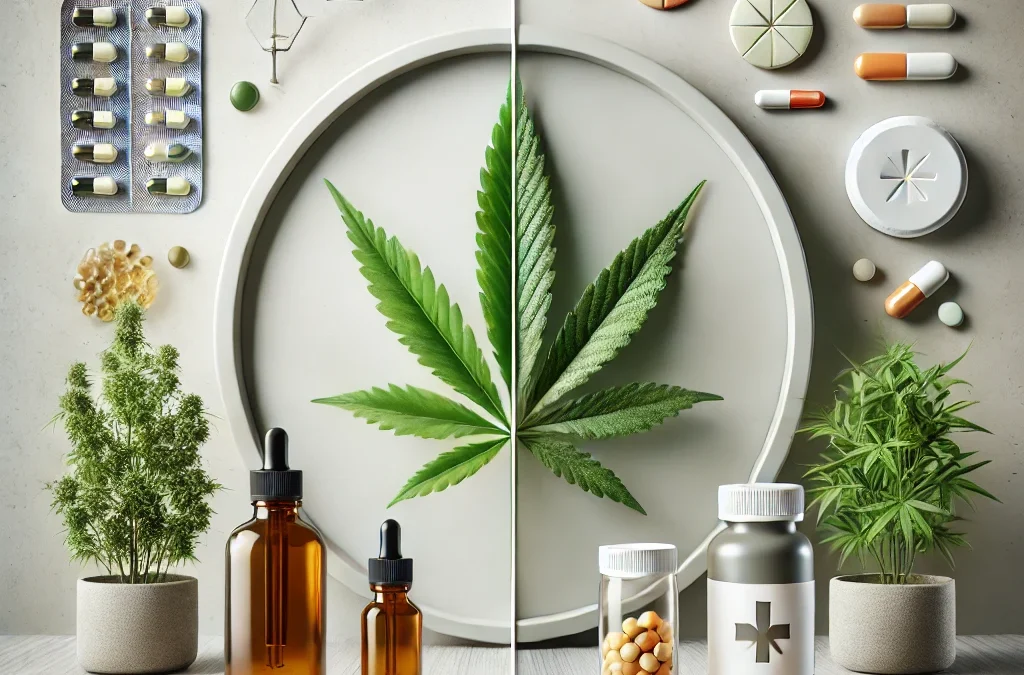Cannabis vs. Prescription Drugs: A Comparison of Effectiveness and Side Effects
With the increasing acceptance of cannabis for medical use, many patients are considering it as an alternative to traditional prescription drugs. While cannabis has shown promise in treating conditions such as chronic pain, anxiety, and epilepsy, how does it compare to prescription medications in terms of effectiveness and side effects? In this article, we examine the latest research on cannabis versus pharmaceuticals, highlighting the benefits and risks of each.
1. Pain Management: Cannabis vs. Opioids
Effectiveness:
- Cannabis: Research indicates that cannabis, particularly strains rich in THC and CBD, can provide significant pain relief for chronic conditions such as arthritis, fibromyalgia, and neuropathy.
- Opioids (e.g., oxycodone, morphine): Opioids are highly effective for severe pain, particularly post-surgical or cancer-related pain. However, they do not address inflammation as effectively as cannabis.
Side Effects:
- Cannabis: Potential drowsiness, dry mouth, dizziness, increased heart rate, mild cognitive impairment.
- Opioids: High risk of addiction, respiratory depression, nausea, constipation, drowsiness, overdose risk.
💡 Key Takeaway: Cannabis may offer a safer alternative for chronic pain management with fewer addiction risks compared to opioids.
2. Anxiety and Depression: Cannabis vs. Antidepressants and Anxiolytics
Effectiveness:
- Cannabis: CBD-rich strains have been shown to reduce anxiety and stress, while low-dose THC can have mood-enhancing effects. However, high doses of THC can trigger anxiety in some individuals.
- Antidepressants (e.g., SSRIs like Prozac, Zoloft): Proven to regulate serotonin levels and improve symptoms of anxiety and depression, but may take weeks to show full effects.
Side Effects:
- Cannabis: Drowsiness, increased appetite, paranoia (in high doses), potential dependence with frequent high-THC use.
- SSRIs & Anxiolytics: Nausea, weight gain, sexual dysfunction, withdrawal symptoms, potential long-term dependence (e.g., benzodiazepines like Xanax and Valium).
💡 Key Takeaway: Cannabis, particularly CBD, may provide short-term relief for anxiety and stress, but SSRIs are more effective for long-term management of major depressive disorders.
3. Sleep Disorders: Cannabis vs. Sleep Medications
Effectiveness:
- Cannabis: Indica-dominant strains with high CBD/THC content can help induce sleep and reduce nighttime awakenings.
- Prescription Sleep Aids (e.g., Ambien, Lunesta): Effective for short-term insomnia but may lead to dependence.
Side Effects:
- Cannabis: Grogginess, mild memory impairment, increased tolerance with frequent use.
- Sleep Medications: Next-day drowsiness, risk of dependency, potential for sleepwalking and memory loss.
💡 Key Takeaway: Cannabis may provide a natural alternative for sleep disorders without the addictive potential of sleep medications.
4. Epilepsy: Cannabis vs. Anticonvulsants
Effectiveness:
- Cannabis: CBD-based medications like Epidiolex have been FDA-approved for severe epilepsy syndromes such as Dravet syndrome and Lennox-Gastaut syndrome.
- Anticonvulsants (e.g., Depakote, Keppra): Generally effective at preventing seizures but may have significant side effects.
Side Effects:
- Cannabis (CBD): Minimal side effects, mild drowsiness, appetite changes.
- Anticonvulsants: Fatigue, dizziness, mood swings, potential liver damage with long-term use.
💡 Key Takeaway: CBD has emerged as a viable treatment for certain types of epilepsy with fewer severe side effects compared to traditional anticonvulsants.
5. Inflammation and Autoimmune Disorders: Cannabis vs. NSAIDs & Steroids
Effectiveness:
- Cannabis: CBD has strong anti-inflammatory properties and may help with conditions like rheumatoid arthritis, Crohn’s disease, and multiple sclerosis.
- NSAIDs (e.g., ibuprofen, aspirin) & Corticosteroids (e.g., prednisone): Commonly used for inflammation but may have long-term side effects.
Side Effects:
- Cannabis: Dry mouth, dizziness, mild cognitive impairment in high doses.
- NSAIDs & Steroids: Stomach ulcers, liver damage (with long-term NSAID use), immune suppression (from prolonged steroid use).
💡 Key Takeaway: Cannabis offers anti-inflammatory benefits with fewer long-term risks compared to steroids and NSAIDs.
Final Verdict: Which Is Better?
Cannabis Advantages:
✅ Fewer risks of addiction compared to opioids and benzodiazepines.
✅ Natural anti-inflammatory properties with fewer long-term risks than steroids.
✅ Fewer severe side effects for epilepsy, sleep disorders, and anxiety.
Prescription Drug Advantages:
✅ More targeted and clinically tested for long-term treatment of chronic conditions.
✅ Faster-acting in some cases (e.g., opioids for extreme pain).
✅ Standardized dosages and regulated by the FDA.
Conclusion: While cannabis shows great promise in treating various medical conditions, it may not fully replace prescription drugs in all cases. However, it can serve as a safer alternative or complementary therapy for patients looking to reduce dependency on pharmaceuticals. As research continues, cannabis may become an increasingly mainstream option for managing pain, anxiety, epilepsy, and inflammation.
References & Further Reading
🔗 American Medical Association – Cannabis and Pain Management
🔗 National Institute on Drug Abuse – Cannabis Research
🔗 FDA – Epidiolex and CBD Research
Save Up to 80% on Your Prescription Drugs
Looking to save big on your prescriptions? GlobalPharmacyMeds.to helps you access high-quality medications at unbeatable prices—save up to 80% by filling your prescriptions through our trusted international pharmacies!
Get the same FDA-approved medications at a fraction of the cost while ensuring safety, reliability, and convenience. Why overpay when you can get affordable, authentic prescriptions delivered to your door?
Take control of your healthcare costs today with GlobalPharmacyMeds.to!




